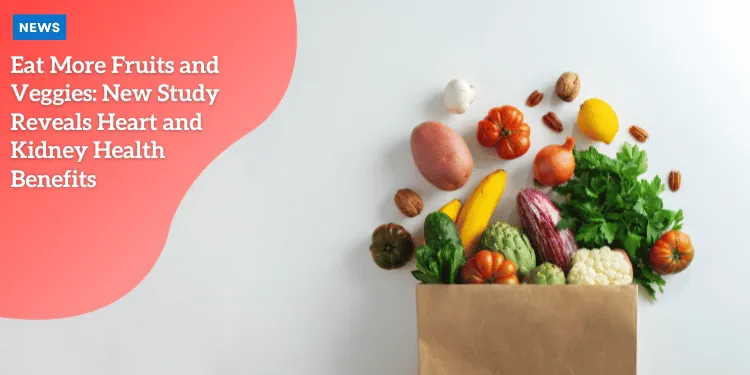Eat More Fruits and Veggies: New Study Reveals Heart and Kidney Health Benefits

Groundbreaking Insights into Diet and Health
New research published in the American Journal of Medicine, led by Dr. Donald Wesson from Dell Medical School at the University of Texas at Austin, has unveiled significant findings on the relationship between diet and health.
Anúncios
This study zeroes in on reducing the risk of heart and kidney disease in individuals with high blood pressure, offering fresh hope for those battling these chronic conditions.
Research Objectives
The primary aim of this research was to uncover whether dietary adjustments could mitigate the major health risks associated with hypertension.
Specifically, the study looked at how altering the acid-base balance in one’s diet could influence heart and kidney health.
Anúncios
Innovative Study Design
This ambitious study was a randomized control trial involving 153 hypertensive participants. The researchers divided the participants into three distinct groups:
- A group that added 2 to 4 cups of fruits and vegetables to their daily diet.
- A group that included two daily doses of baking soda.
- A control group that continued with standard medical care.
The study spanned over five years, providing a robust dataset for meaningful conclusions.
Targeted Outcomes
Focusing on two key areas, the study sought to:
Anúncios
- Improve kidney health
- Enhance heart health
By specifically tracking these outcomes, the research aimed to establish a clear link between dietary patterns and health improvements in people with high blood pressure.
Concluding Remarks
The groundbreaking nature of this study lays a solid foundation for future dietary guidelines aimed at combating hypertension-related health risks.
Through meticulous research, Dr. Wesson and his team have spotlighted the potentially transformative role of diet in managing chronic disease.
Study Design and Methodology
Randomized Controlled Trial
The study, spearheaded by Dr. Donald Wesson at the Dell Medical School of the University of Texas at Austin, aimed to assess the impact of dietary changes on heart and kidney health in people with high blood pressure.
This investigation included a randomized control trial involving 153 participants diagnosed with hypertension.
Participant Groups
Participants were divided into three distinct groups, each employing a unique intervention strategy over a five-year period:
- Fruits and Vegetables Addition: This group incorporated 2 to 4 cups of fruits and vegetables into their daily diet.
- Baking Soda Supplementation: This cohort received two doses of baking soda daily, each dose consisting of four or five 650-milligram tablets.
- Standard Medical Care: The control group followed their usual medical treatment without any dietary changes.
Intervention Objective
The primary goal was to determine whether reducing dietary acid through base-producing foods like fruits and vegetables could mitigate complications related to hypertension, particularly focusing on heart and kidney health.
Methodology and Analysis
Researchers conducted yearly check-ups on participants, evaluating the overall health impacts of the different dietary interventions.
Blood pressure levels, kidney function (measured through filtration rates), and heart health (assessed by cardiac tests) were meticulously monitored.
Over the five years, detailed data were gathered to assess both immediate and long-term health outcomes.
By concluding the methodological setup, the study set a foundational understanding for the subsequent analysis of results and further exploration of acid-base balance in the diet.
Key Findings
Improved Kidney Health
After five years of research, Dr. Donald Wesson and his team found that both the plant-based diet and the baking soda intervention improved kidney health.
Participants who added more fruits and vegetables or baking soda to their diets saw noticeable improvements in kidney function, highlighting the significance of reducing dietary acid.
High acid levels, predominantly coming from animal products, have been linked to adverse effects on kidney health, whereas base-producing foods, like fruits and vegetables, demonstrate protective benefits.
Enhanced Heart Health
Interestingly, only the group that added more fruits and vegetables to their diets experienced improved heart health.
This finding underscores the unique benefits of plant-based foods in managing cardiovascular risks.
While baking soda helped mitigate kidney issues, it didn’t translate to the same heart health benefits.
This study further amplifies the health value of consuming base-producing foods, specifically fruits and vegetables, for overall cardiovascular wellbeing.
Importance of Base-Producing Foods
The study reinforces the vital role of base-producing foods in the diet. Consuming a diet high in acid-producing foods, like meat and other animal products, can be detrimental to both heart and kidney health.
Conversely, a diet rich in plant-based, base-producing foods can help neutralize this acid load, offering a protective effect.
The research conducted by Dr. Wesson illuminates the foundational importance of fruits and vegetables in dietary planning, particularly for individuals with high blood pressure.
Transition
This emphasis on plant-based diets aligns with existing dietary guidelines and presents new opportunities for nutritional strategies in managing chronic diseases.
Understanding Acid-Base Balance in Diet
The Acid-Producing Effect of Animal Products
Our diet’s acid-base balance plays a crucial role in our overall health. Animal products, notably meat, tend to produce acid when metabolized. This is due to the high content of sulfur-containing amino acids that breakdown and produce acid.
Excessive dietary acid can burden the kidneys and negatively impact their function over time.
For individuals with high blood pressure, consuming large quantities of acid-producing foods may exacerbate the risk of kidney disease and other health complications.
The Base-Producing Benefits of Fruits and Vegetables
On the flip side, fruits and vegetables are base-producing. Essentially, when these foods are metabolized, they generate bicarbonate, which helps neutralize acid in the body.
This balancing effect is vital for maintaining kidney health and managing high blood pressure.
In Dr. Wesson’s study, participants who increased their intake of fruits and vegetables saw significant improvements in kidney health.
Even more notably, only those in the plant-rich group showed enhanced heart health, further underlining the importance of base-producing foods.
Achieving Balance in Your Diet
Balancing your diet to include both acid-producing and base-producing foods can provide extensive health benefits.
While it may be unrealistic to completely avoid animal products, incorporating more fruits and vegetables can offset their acid-producing effects.
Nutritionists generally recommend aiming for 4-5 servings of fruits and vegetables daily to achieve a healthy balance.
Maintaining this balance is especially crucial for those managing chronic conditions such as hypertension.
By adopting dietary practices that emphasize a higher intake of plant-based foods, individuals not only support kidney and heart health but also benefit their overall well-being.
Understanding how everyday food choices impact our body’s acid-base balance provides a clear pathway for better health outcomes.
Recommended Dietary Approaches
The DASH Diet for Heart Health
For those aiming to manage high blood pressure and promote heart health, the DASH diet is a trusted ally.
Short for Dietary Approaches to Stop Hypertension, it emphasizes the inclusion of fruits, vegetables, whole grains, and lean meats.
What makes the DASH diet particularly beneficial is its reliance on foods known to be heart-friendly and rich in nutrients that help manage blood pressure levels.
What to Include
A balanced DASH diet includes:
- Fruits and Vegetables: Aim for 4-5 servings each day. Think bananas, berries, leafy greens, and cruciferous vegetables like broccoli and cauliflower.
- Whole Grains: Incorporate whole-wheat bread, brown rice, and oatmeal into your daily meals.
- Lean Proteins: Focus on lean meats such as poultry and fish, alongside plant-based proteins like beans, nuts, and seeds.
- Low-Fat Dairy Products: Include milk, yogurt, and cheese, but opt for low-fat or non-fat versions.
This diet pattern not only favors heart health but also supports kidney function, as highlighted in Dr. Wesson’s study.
Daily Serving Goals
A practical goal is to consume 4-5 servings of fruits and vegetables daily. This can look like:
- Breakfast: Add a banana or a handful of berries to your oatmeal.
- Lunch: Enjoy a salad loaded with leafy greens, cucumbers, and tomatoes.
- Snacks: Keep apple slices, carrot sticks, or a small fruit salad handy.
- Dinner: Have at least two sides of steamed broccoli and roasted sweet potatoes.
Making It Work
While these dietary guidelines are clear, adhering to them can be a challenge.
The availability of fresh produce and its appeal in daily meals is a common stumbling block.
However, small steps like experimenting with different seasonings and cooking methods can make veggies more enticing.
Challenges in Access
Not all communities have easy access to fresh produce, which complicates the adoption of such diets.
To address this, public health initiatives and policies must focus on improving the availability and affordability of fresh fruits and vegetables.
Embracing these dietary changes can significantly enhance your heart health and overall well-being.
Transitioning to our next topic, we will explore the broader context and future directions necessary to make these diets more accessible to everyone.
Challenges and Future Directions
Limited Availability and Attractiveness of Fruits and Vegetables
One of the major challenges in promoting a fruit and vegetable-rich diet is their limited availability in certain areas.
Not everyone has easy access to fresh produce, leading to dietary choices that are often dominated by processed, less healthy options.
This disparity is particularly prevalent in low-income communities, where fresh produce might be scarce or too expensive.
Additionally, there’s a persistent stigma surrounding fruits and vegetables, especially among those who may not recognize their versatility and enjoyability.
Many people find plant-based diets less appealing due to a lack of knowledge or exposure to tasty and satisfying vegetable-based meals.
To overcome this, it’s essential to make fruits and vegetables more attractive by exploring creative culinary techniques.
For instance, using seasonings, cooking methods, and sauces that align with one’s cultural background can make vegetables more delicious and appealing.
Strategies to Improve Access
To address these barriers, several strategies can be employed. Public health initiatives must focus on improving the supply chain to ensure fresh produce reaches all communities.
Subsidies and financial incentives can also help reduce costs, making fruits and vegetables more affordable.
Farmers’ markets, community gardens, and mobile fruit and vegetable vendors are practical solutions already making a difference.
By integrating these alternatives into urban and rural planning, access to fresh produce can be significantly improved.
Educational programs that teach people how to cultivate their own gardens also offer a sustainable way to enhance the availability of fresh produce.
Importance of Integrating Nutrition into Chronic Disease Management
Managing chronic diseases like hypertension, heart disease, and kidney disease requires a holistic approach.
Nutrition must be a cornerstone in this strategy. Health systems should prioritize dietary counseling and support for patients, enabling them to adopt healthier eating habits.
Medications will always be a part of chronic disease management, but coupling them with a strong nutritional focus can lead to better outcomes.
This study highlights the pressing need for healthcare providers to champion dietary changes as part of comprehensive disease management plans.
To foster these changes, collaboration across sectors — from government bodies to healthcare providers and community organizations — is crucial.
By working together, we can develop and implement effective dietary programs that support long-term health and well-being.
Conclusion and Recommendations
Foundation of Managing Hypertension
Incorporating diets high in fruits and vegetables should be a cornerstone in the management of hypertension.
The study led by Dr. Donald Wesson from the University of Texas shows that such dietary changes can significantly impact both heart and kidney health.
A plant-based diet not only improves these critical health outcomes but also underscores the necessity of base-producing foods to balance the acids from animal products.
Encouraging Plant-Based Foods
To maximize health benefits, increasing plant-based food intake is crucial.
This can be achieved by aiming for 4-5 servings of fruits and vegetables daily.
The DASH diet, which emphasizes fruits, vegetables, whole grains, and lean proteins, is particularly effective for heart health.
Simple strategies, such as choosing seasonal fruits and experimenting with flavorful vegetable recipes, can make the diet more appealing and easier to follow.
Need for Continued Research and Public Health Initiatives
Despite the clear benefits, challenges like limited access to fresh produce and adherence to plant-based diets exist.
Future research should explore ways to make healthy foods more accessible and attractive.
Public health initiatives can play a vital role in addressing these barriers through improved supply chains, subsidies, and local programs.
A collaborative effort is necessary to integrate nutrition into chronic disease management.
Implementing nutritional changes alongside medical interventions can greatly enhance health outcomes for those with high blood pressure.
By adopting these strategies, we can make strides in managing and potentially reducing the prevalence of heart and kidney disease.





